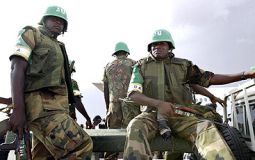US cuts AU peacekeepers funds as Darfur deteriorates
By OLGA PIERCE
Jan 3, 2006 (WASHINGTON) — Despite an unusual personal plea by U.S. Secretary of State Condoleezza Rice, the U.S. House of Representatives voted down a bill to renew $50 million in aid to the African Union peacekeeping mission in Darfur. The withholding of funds comes just as hostilities between Sudan and its neighbor Chad threatens to undermine the struggling peace process.
 “We’re disappointed that Congress chose not to fund African Union peacekeepers,” said Amanda Rogers-Harpers, a spokeswoman for the State Department. “We share Congress’s concern, and will continue to work with Congress and the international community on this issue.
“We’re disappointed that Congress chose not to fund African Union peacekeepers,” said Amanda Rogers-Harpers, a spokeswoman for the State Department. “We share Congress’s concern, and will continue to work with Congress and the international community on this issue.
Rice sent a letter on Dec. 15 to House members personally asking them to renew funding to the Darfur region. She and the deputy secretary of state then made personal phone calls asking members of Congress for help, Rogers-Harper said.
High-profile members of Congress, such as Sen. John McCain, R-Ariz., also came out in support of U.S. military aid for Darfur in the days leading up to the vote, but the House voted not to reinstate the $50 million in funding which had been stripped from a defense spending bill a month earlier.
The United States has provided more than $170 million in support of the peace effort, including airlifting troops and operating 34 camps for peacekeepers in the troubled region where the U.N. estimates as many as 3.4 million people have been affected since armed conflict broke out in early 2003.
There are currently about 5,000 African Union troops in Darfur.
The State Department is working to find alternative funding sources, but it will be a difficult process, said Rogers-Harper.
The Sudanese government in cooperation with Arab militias called the Janjaweed have been attempting to gain control of Darfur, the country’s westernmost region, since February 2003 when two rebel groups, the Sudan Liberation Army/Movement and the Justice and Equity Movement formed to end the perceived marginalization of the Fur, Masaalit and Zaghawa ethnic groups there.
An effective African Union peacekeeping operation depends on support from the United States, said Robert Rotberg, Director of the Belfer Center Program on Intrastate Conflict and Conflict Resolution at Harvard University.
“The $50 million was not totally critical, but very important to keeping African Union support for the peace process alive,” Rotberg said. “A strong mission and mandate depends a lot on support from the United States.”
If funding from the United States does not materialize, the African Union will likely be forced to scale down its presence in Darfur at a time when it should be getting bigger, he said. “It was very short-sighted of Congress to take $50 million away from the critical mission of saving lives in one of the world’s most troubled regions.”
Key players in the conflict may take the discontinued funding as a sign that the United States is no longer interested in the situation and be emboldened to commit more acts of violence, he said.
Meanwhile, conditions for civilians in Darfur continue to deteriorate, according to U.N. Secretary General Kofi Annan’s latest monthly report on the conflict, released Dec. 29.
Between October and November 2005, civilian deaths nearly doubled from 70 to 120 and the Sudanese government continues to make no effort to prevent attacks by Janjaweed militias on the region’s non-Arab inhabitants, the report said.
“Large-scale attacks against civilians continue, women and girls are being raped by armed groups, yet more villages are being burned and thousands more are being driven from their homes,” Annan said in the report.
Annan called the current round of peace talks in Abuja, Nigeria critical, adding that they must be decisive.
However, recent political developments, in addition to the withdrawal of American support, threaten to unravel the peace process altogether.
In the lead-up to the talks, the rebel Sudan Liberation Movement split due to an internal leadership struggle between two rival leaders, Abdul Wahid al-Nur of the Fur people and Minni Arko Minawi of the Zaghawa people, complicating the bargaining process.
And since December, the government of neighboring Chad has engaged in a war of words with the Sudanese that could lead to further violence in Darfur.
On Dec. 22, Chadian President Idriss Deby gave a speech on national radio accusing the Sudanese government of trying to export the war in Darfur to Chad by encouraging a military rebellion there.
Deby claimed the Sudanese government supported a rebel attack on the Chadian border town of Adre by a rebel group called Rally for Democracy and Liberty. The group is composed of former Chadian soldiers who deserted en masse on December 10 at the prompting of several army officers who called on them to join an army to fight Deby.
The Sudanese government had formerly accused the government of Chad of aiding rebel groups in Darfur who belong to the same ethnic group as Chadians.
Though the superior strength of the Sudan’s military makes outright war between the two countries unlikely; the tension could fuel skirmishes that displace additional civilians and interfere with relief efforts.
Amid the violence, the United Nations refugee agency responsible for caring for the 200,000 Sudanese refugees in Chad released a statement on January 2 vowing to continue its work to the fullest extent possible.
“Humanitarian aid workers are as dedicated as ever: food distribution, education and health services are provided; protection services are ongoing,” the agency said.
(UPI)
